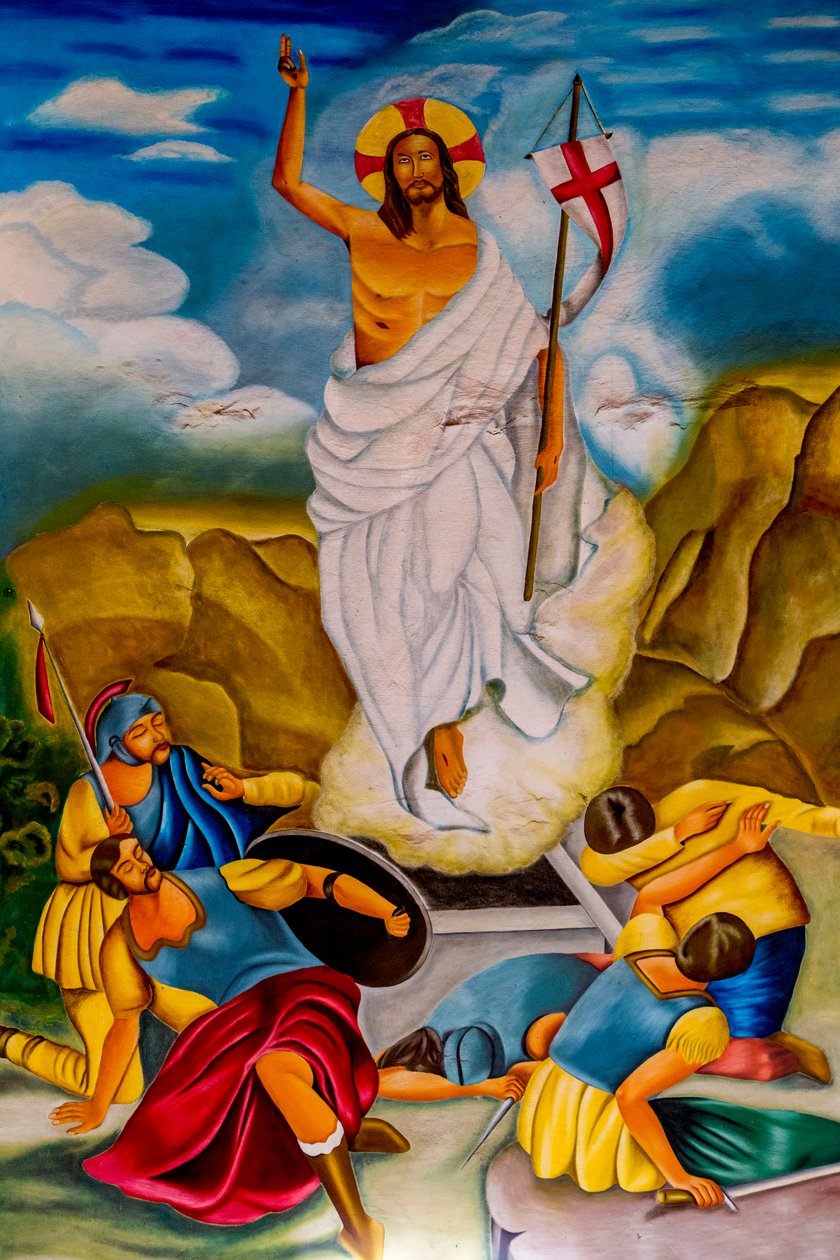When they go low, we go high.
Michelle Obama’s words struck a chord when she spoke them in 2016 (although apparently she has modified or pulled back from them somewhat since then.)
There was something hopeful, civil, honorable, principled, dare I even say “Christian” about her phrase. Something not unlike “turn the other cheek” or “love your enemies.” “Do not be overcome by evil, but overcome evil with good.”
Nine years later, I often see friends and colleagues, anti-MAGA Christians, expressing something similar. Well-intentioned social media posts about not resorting to meanness or pettiness or name calling. Not being reactive. Not firing back impulsively. Not returning hate for hate.
You’ve seen them too. Many of you have probably said or posted something similar.
My point is not to criticize these gracious posts or the intentions behind them. Instead, it is to wonder about what they really mean. What does “going high” look and sound like in the concrete and specific? I’m not seeking any absolute purity or moral consistency, but only wondering how or if we can hold on to something like Michelle Obama’s hopeful call while also engaging with a vile man doing all kinds of evil.
In other words, I’ve had many friends and colleagues express something about trying to be Christ-like or civil. A few days or sometimes just hours later, they say or post things that might seem to be contrary to their original good intention.

For a small sliver of Christians, “going high” would mean almost absolute silence, not unlike Jesus before Pilate–”he opened not his mouth.” This is non-resistance with no real concern about outcomes. Today, it could look like those friends who tell me that their role, at this juncture, is one of listening or tenderness or generosity.
Another approach to “going high” would be Christians who advocate non-violence, presumably including bellicose language or combative social media posts, trusting this will eventually bring good results. This too is very much a minority position within the Christian community. While it might seem similar to non-resistance, it is significantly different. Typically it has a strategic element. It is concerned with outcomes–renouncing violence, but not necessarily renouncing power or winning. Going high will ultimately prevail. Evil will be overcome by good.
But it is rather restrictive to assert that these two minority Christian approaches are the only ways for Christians of “going high.”
A couple paragraphs ago, I called the president “a vile man doing all sorts of evil.” By doing so, have I gone low?
Jesus called Herod Antipas a “fox.” He called some religious leaders “whitewashed graves” and the crowd around him a “wicked and perverse generation.” Saint Paul wrote that he wished his adversaries would castrate themselves. Personally, I especially like the use of humor to critique the MAGA regime. It feels harmless and humiliating at the same time. Poking fun and popping egos.

Many friends–Christians, people that I respect deeply–have been far more caustic in their rhetoric. Again, my aim is to be curious, not judgmental. Do they believe their scorching language isn’t at odds with their statements about remaining calm and peaceable? Is there some invisible line or unspoken principle that tells us we have gone too far?
Or maybe it is the difference between language and deeds. Scathing language is acceptable, but violent actions are not? Maybe “Speaking the truth in love” is relevant here. Love of? Nation? Democracy? Our neighbor? Yet we all know that fiery language fuels fiery deeds.
Or maybe, like all of us, they have their own contradictions, good intentions they’re unable to fulfill. “The good that I would, I do not.”
Or maybe, they’ve concluded (somewhat like Michelle Obama) that the wickedness they face is so depraved, they’ve abandoned their earlier aspirations to “go high.” It simply won’t work. Fighting fire with fire is the only option now.
How would you describe where you are at? I think I vacillate between them all. I’m simply not sure what it really looks like to overcome evil with good right now?

I wonder too if we haven’t quite fully absorbed the current situation. We’re still asking ourselves “Can this really last? Just how awful will it get?” We’re newbies, rookies in the resistance game. We haven’t yet seen or endured enough to become creative and courageous in truly costly ways. Ways like the Birmingham bus boycott, Tiananmen Square in 1989, Gandhi’s Salt March, the Warsaw Ghetto uprising, even the Boston Tea Party. We’re more adept at writing letters and sharing memes.

As I write, Marines are being sent to Los Angeles, supposedly to stop the so-called riots. What if, for example, lots and lots of white, middle class parents of young, blonde, blue-eyed children sent their kids to join the protesters? No doubt it could be extremely risky. Foolish, really. But would the National Guard or Marines attack them in the same way that they might a bunch of “left wing scum and brown-skin radicals”? Who can say? And I’m certainly not suggesting this as a viable strategy or volunteering my grandchildren. They have brown eyes, BTW.
I’m pointing to the uncertainty, our conflicted feelings, our still forming ideas about how to resist in ways that are effective and yet claim some bit of the moral high ground. In the here and now, how are we to be as shrewd as serpents and as innocent as doves?

And then, lastly, this. Are we naive to believe that being virtuous and “going high” can ultimately prevail? The wisdom of our parents, our junior high guidance counselors, and scout troop leaders, good folks all, told us that taking the high road, being decent and upright would eventually undo the bully, and conquer evil. It’s a nice, optimistic idea. We read about fairies and sugar plums, while others read Machiavelli.
Can we really hope that “going high when they go low” actually works? Or are we being guided more by modern notions of human progress than the Christian story?
A nagging voice within wonders if the Christian story might instead tell us that the way to God’s glorious future came through death–actual death, not death as symbol or simile–and resurrection.


8 Responses
Thanks, Steve. You voiced the conundrum well.
You hit so many nails on their heads for me. I was raised to believe we are ALL created in the image of God. Therefore I try to say people can DO evil things. I don’t like name calling but then you had to point out Jesus called the crowd “a wicked and perverse generation”. When I DO/THINK something evil does it make me evil? Is there a line in the sand where we are ok “calling evil good”? M Scott Peck ThePeople of the Lie comes to mind.
May it be so: “going high”, I wonder is shining a Light in the darkness and by God’s Grace and Mercy it will overcome the darkness. What would that “action” look like? Thank you Steve.
Thank you, Steve, for putting words to the unease I feel right now. What can/should I do, think, say, and would it make any difference? I think of the difficult situations people before us have had to endure in fighting back against evil regimes and wonder if that’s where we are and how can we effectively ‘fight’ against such evil?
Thank you Steve. As one who has been outspoken on many fronts, I would only add this cautionary comment: Count the cost!
Thanks Steve,
I echo Marlin. Count the Cost. There are many. A few other thoughts:
Humor-cutting the legs under a “dictator” (bully, whatever you want to say) takes the wind out of their sails and punctures the ego
Truth-if you claim the bully is lying all the time, you must speak truth. If you lie (when going low), what’s the difference?
Power-the bully claims “right-handed power” (Capon), which is power “over” to coerce, violence, etc. Those who stand against the bully must claim “left-handed” power “with” (its sacrifice, love, solidarity). You must gather people and money to overcome the bully.
Clear coordinated ACTION that goes beyond marches/protests-you must push any opposition leadership to the bully with reachable goals that makes your community better (particularly in comparison to the bully, who may in it for himself)
“Turn the other cheek”-People don’t get this teach. They think it means just sit down and take it. Quite the opposite. It is a “third way” (I know played out term), but it’s meant to exercise “left-handed” power that forces the bully to show his hand and look ridiculous. You could argue that China did something like this (not exactly) with the tariff fight (others did as well), and when push came to shove the bully folded like a cheap suit (TACO).
This action also summarizes the work of the civil rights movement, always working to help the bully reveal who he is by pulling out the worst of his white supremacy. Also, the civil rights movement was full of kids (college).
Of course, in the end, one could argue that as soulless as the country was back in the 60s, it hadn’t quite turned Dr. Faust. It sometimes feels like we have now, and much of the church has led the way to the contract. (sigh)
What to do?
One of my wisdom people said … “if you have 5 battles to fight and only 2 bullets, you better choose wisely.”
Despite the violent imagery, I’ve appreciated and used the inherent discernment implied. In the midst of all the chaos I find the greatest impact is in me, not massive impact on society. I choose my battles, measure the risks and take action. I don’t want to be Laodicia lukewarm.
I like this analysis. It makes me think: why not go high in all the ways you’ve mentioned – either personally or being supportive others in the body of Christ to do so. I’ve done many of them: silence, writing a sarcastic musical parody of the president using the Beatles Abby Road trilogy for a melody (Mean Mr. Mustard, Polythene Pam, She Came in Through the Bathroom Window), sending a gentle rebuke to a MAGA senator, using one-line sentences to counter MAGA-oriented Christians I’m talking with. All we can do is chip away. But the best thing to do is as directed by the Bible: pray for our rulers and bless our enemies. We don’t want them to be blessed in terms of succeeding in their plans, but in terms of transforming their hearts. All things are possible with God. President Chester Arthur came into office as a beneficiary and strong advocate of corrupt cronyism. But through a number of letters from a D.C. widow who appealed to him to act differently, he changed his ways on many matters and signed the Pendleton Civil Service Reform Act of 1883.
Today in a Huffington Post, article about Sen. Tina Smith of MN confronting Sen. Mike Lee of Utah about his posts about the Minnesota killings, Alexandra Cromer, a licensed counsellor, said this about directly confronting a bully, “The most efficient form of communication that elicits the most potential for change is just that: direct, clear communication with that person,” she said. “It’s important to communicate clearly and objectively to others when you want to make sure that they understand the harm caused.” She also said make sure you are in a safe space first before this.
Another approach to try is dialectical behavioural therapy (DBT) also known as DEAR MAN which she explained as follows: “Describe the situation, Express your feelings, Assert your goals for the conversation, Reinforce your willingness to be flexible in communication, Mindful thought patterns help us stay grounded, Appear confident, and Negotiate.” We need to try all of this vs. DJT et al. Of course another article described Trump as completely impulsive with no one reigning him in at all…